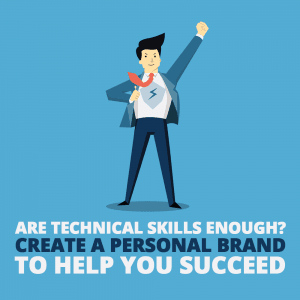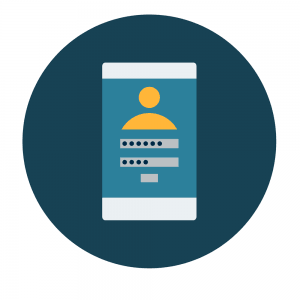Are Technical Skills Enough? Create a Personal Brand to Help You Succeed
You know what would be awesome for your career? A well-crafted, compelling brand story about your skills, knowledge, and qualifications as a programmer.
Programming knowledge and expertise will give you a good head start, but to propel your progress graph steeply and quickly, you’ll need to unlock opportunities that exist outside of a pre-charted path.
So if your desire is to transform your programming career into an exemplary story of success, a personal brand will help you get there.
The good news is that you can create your personal brand story. The next best news is that this article is filled with actionable tips that will empower you to build and share that story.
But Wait … What Is Personal Branding?
Personal branding means creating an authentic character for yourself that makes you distinct from others in the same industry or group.
Building your personal brand as a developer is more complex now than ever before because of social media, blogs, websites, thought leadership, and more. What was earlier limited to an immediate network of people in one’s work or personal life has now exploded into the world at large.
As a skilled developer, you are no longer confined to working in a physical office, so why confine your personal brand?
How Will Building My Personal Brand Empower My Career?
Your personal brand will make you memorable in the minds of your clients, employers, and peers. It will give them an opportunity to see various aspects of your personality, such as your professional knowledge and your personal opinion. It will give your candidature an upgrade from a mere “job-seeker” to a dynamic professional.
Building a personal brand:
- Establishes you as a thought leader in a niche space. Become an authority in a specific area of expertise by adding value to the existing knowledge and information available in that space.
- Improves your visibility in the industry. As an influencer, you can get quoted in the news media and on industry blogs. In the future, if you launch an entrepreneurial venture, this will further help you in marketing your startup.
- Grows your professional network. Create more career opportunities, increase incoming referrals, get access to advice and mentorship from industry experts, and boost your positive influence by building new connections consistently.
- Boosts your credibility. Build more trust in your abilities and skills as you attract more clients and projects.
- Ultimately, a personal brand increases your revenue. As you fuel your career with a compelling brand story about yourself, it directly increases your earnings as a programmer.
If you wish to boost your career with a personal brand, here’s how to get started:
Get a Username and a Domain Name
As a developer, the most important thing you need to take care of is to find a username that resonates with your personality.
Well, in all probability you already have a username that you use everywhere. Can that name be developed into your professional personality? If not, then let’s find a username that has the potential.
This username can become your identity on important developer platforms such as Stack Overflow and GitHub. Over time, this will build a higher brand recall for you. You can extend the same username to register a domain name for your website or blog.
A domain name is a name you choose for your website. A website is a set of related web pages and resources uploaded on a web hosting server under a single domain name. The hosting servers are identified on the internet by their IP addresses, which are difficult for humans to remember. Therefore, the key function of a domain name is to give your website a notable identity without requiring to remember numeric IP addresses.
Here are a few tips on how to select a domain name:
- Keep it short, descriptive, and meaningful.
- Make it free of abbreviations, numerics, hyphens, and misspellings.
- Steer clear of copyrighted names.
- Choose your own name so that it looks professional, and consider an industry-relevant domain extension. For example, JohnSmith.tech.
Build a Virtual Portfolio
Once you have a domain name, use it to build a website that has details on all of your programming work. Think of it as a live portfolio with a dynamic view of your hackathon projects and programming assignments.
Your website is a fantastic place to showcase your industry certifications, as well as any awards and achievements that you might have received. You should also include links to your profiles on Github, Stack Overflow, LinkedIn, Twitter, and other social media accounts.
You can even get a logo designed with your initials and use it on your website and social media. A logo will give your personal brand an impressive, easily distinguishable visual identity. It will also make you look professional and sophisticated. For personal brand logos, use of initials is a fantastic idea, although you can include your full name or domain name as well.
The domain name for this virtual portfolio will become your online identity. You can share it with potential clients and employers so that they can experience your top-notch work first-hand.
Start Blogging
Once you have the website live, it’s a good idea to start blogging to drive organic traffic to your website. Begin by picking a niche subject that’s relevant to your work and share your expertise on that. So instead of writing about data science, computational thinking, and web development (broad topics), write about JavaScript MVC framework or Python 3.6 f-strings (niche topics).
Now, you might say that you are not a writer. Even if you are not, you can still mine for gold with your blog. After all, the secret to successful blogging is consistency, not perfect sentences (that’s what proofreaders are for!).
If you resolve to post something on your blog once every week and stick to it for a year, you will create a significant number of blog posts by the end of the term.
Some benefits of blogging are:
- Sticking to a niche subject will rank your website high organically.
- Posting authentic, fresh content regularly will get you backlinks from various websites who might be referencing to your posts. This will indicate to search engines that you have a credible blog.
- Demonstrating your subject-matter expertise will indicate the scale of your knowledge to your website visitors.
A few things that you can blog about are:
- Tips, tricks, and advice.
- The genesis of your various projects.
- Your experience at hackathons.
- Interviews with other industry experts that you admire.
- Your challenges as a programmer and how you tackle them.
- Futuristic ideas that you wish to work on someday.
These ideas are broad and can apply to any programming blog. On the other hand, a topic such as “how to stop getting ‘SyntaxWarning’ in Python” is more aligned with a niche blog. Here are some more ideas to help you get started:
- How to articles
- Tutorials
- Listicles
- Recent upgrades
- Reviews
- Tools
Get Active on Social Media
It sounds like cliche advice, but getting active on social media is an easy way to get noticed and build a personal brand.
When someone is looking you up on the internet and finds your inactive social media profiles, it creates a negative impression. On the other hand, if they find an active profile with relevant posts, it piques their interest and convinces them that you are invested in your career and take interest in various other aspects of life.
And that’s exactly what your social feed needs to be: an extension of your true personality. While Facebook and Instagram are the most popular social networks worldwide, you can use Twitter and LinkedIn to target a niche professional audience. Through Twitter hashtags and LinkedIn groups, you can directly reach out to an evolved community of programmers or tech brands and startups.
You don’t need to be incessantly posting all the time (although there are free tools that would do that for you), but just putting out an update once every couple of days is a great way to start.
Here are some things you can talk about on your social media:
- Industry news to indicate that you are up-to-date with your knowledge and keep tabs on the latest developments.
- Posts from programming blogs you follow to strengthen your social media network (by tagging them or by engaging with them in conversation).
- Posts from your own blog to drive more traffic to it, as well as to display your expertise.
- Personal opinions of your interests and hobbies to add a human element to your virtual personality.
Consistency is key to building an effective brand. To that effect, register the same username across all of your digital identities, including your blog and social media networks. For example, if your blog domain is JohnSmith.tech but you cannot find JohnSmith as a username on Twitter or Instagram, go for JohnSmithTech to maintain consistency.
Use Branded Links
Branded links are shortened URLs with a brand name. Usually, when you shorten a URL to share on social media, you use bit.ly (or goo.gl, but Google has recently decided to discontinue that service). These links are clunky and unpronounceable. Instead, you can brand these shortened links with a domain name that you own so they look professional.
For example, instead of using bit.ly/2jZFNLk, the link can be branded as go.tech/mktg. This gives you a valuable opportunity to reinforce your brand name with each link shared on social media (or even in emails). When you share content with a branded link, it is indicative of the authenticity of the content, since it comes with the stamp of your name. By seeing your brand name over and over, your social media followers will have a higher brand recall for you. Branded links make you look professional and credible. Most URL shortening services allow the use of custom domains.
Take Your Career to the Next Level With a Personal Brand
By using these tactics, you’ll be able to build a fantastic personal brand that will boost your career and put you on the path to continuous growth and learning.
Start small and build upon it as you go along. Take inspiration from others in your space who have an impressive online presence, and create a plan of action broken down into small chunks.
And remember, building a personal brand takes time! So take it easy as you work toward skyrocketing your career with your brand story.
| Published on Java Code Geeks with permission by Suman Das, partner at our JCG program. See the original article here: Are Technical Skills Enough? Create a Personal Brand to Help You Succeed Opinions expressed by Java Code Geeks contributors are their own. |








